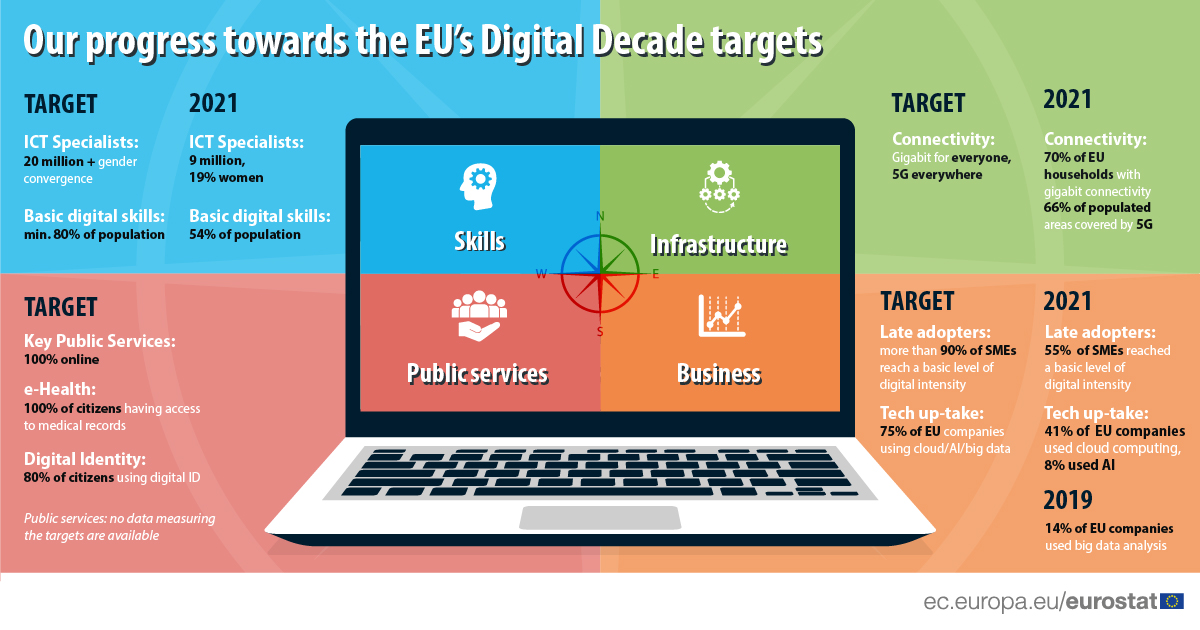05/08/2022
The EU’s vision and concrete targets for digital transformation by 2030 are set out in a Digital Compass that evolves around four cardinal points: skills, digital transformation of businesses, secure and sustainable digital infrastructures and digitalisation of public services. Progress towards these 2030 targets is measured by a monitoring system based on the Digital Economy and Society Index (DESI).

Source datasets: isoc_sks_itspt, isoc_sk_dskl_i21, isoc_cicce_use, isoc_eb_ai,
isoc_eb_bd, isoc_e_dii, isoc_cbt
Skills
The ambitions set for the area of skills in the Digital Compass are that, by 2030, at least 80% of all adults should have at least basic digital skills, and that there should be 20 million employed ICT specialists in the EU, with increased women’s participation.
In 2021, 54% of people aged 16-74 in the EU had at least basic overall digital skills, 26 percentage points (pp) below the 2030 target set in the Digital Compass.
Meanwhile, almost 9 million people in the EU worked as ICT specialists, a little over 11 million below the 2030 goal set in the Digital Compass. Despite a slight increase over the last decade, women accounted for less than a fifth of ICT specialists (19.1%) in 2021.
Business
The goals for the EU’s digital transformation of businesses state that by 2030, three out of four EU companies should use cloud computing services, big data and artificial intelligence, and more than 90% of small and medium-sized enterprises (SMEs) should reach at least a basic level of digital intensity.
In 2021, 41% of enterprises in the EU reported that they bought cloud computing services while 8% of EU enterprises used at least one AI technology, which is 34 pp and 67 pp shy of the ambitions set in the Digital Compass, respectively. Moreover, in 2020, 14% of enterprises in the EU reported that, in 2019, they had performed big data analysis (from any data source) or had had another enterprise or organisation perform big data analysis for them, which leaves 61 pp to make up in the coming years.
A basic level of digital intensity was reached by 55% of EU SMEs in 2021, which is 35 pp shy of the ambition set in the Digital Compass.
Infrastructures
Some of the ambitions set in the Digital Compass for the secure, performant and sustainable digital infrastructures are that, by 2030, all EU households should have gigabit connectivity and all populated areas should be covered by 5G.
In 2021, fixed very high capacity networks that have the capabilities of offering gigabit connectivity were accessible to 70% of EU households, leaving 30 pp to make up in the coming years. Meanwhile, 66% of populated areas were covered by 5G, which is 34 pp shy of the 2030 target.
For more information:
Methodological notes:
To contact us, please visit our User Support page.
For press queries, please contact our Media Support.
Thank you for your feedback.
We are sorry to hear that. You can report the issue here.
Thank you for the information. We will investigate the issue.
Was this page useful?
News
Data
Publications
About us
Opportunities

